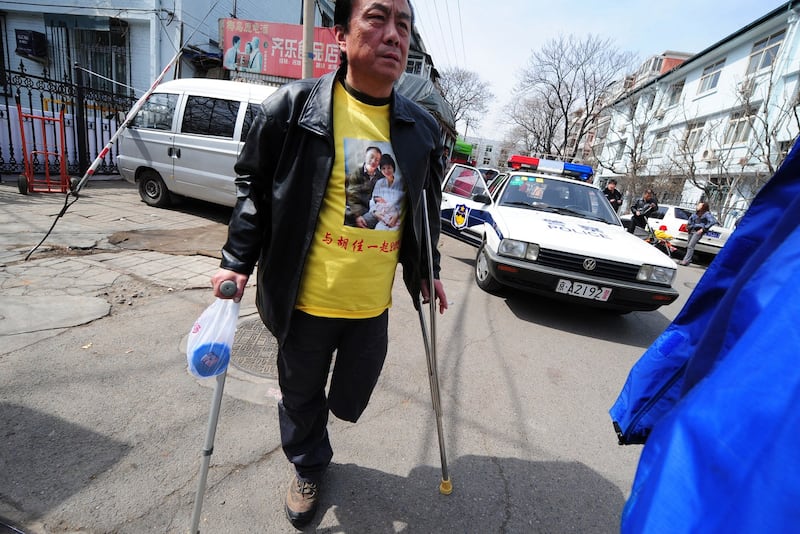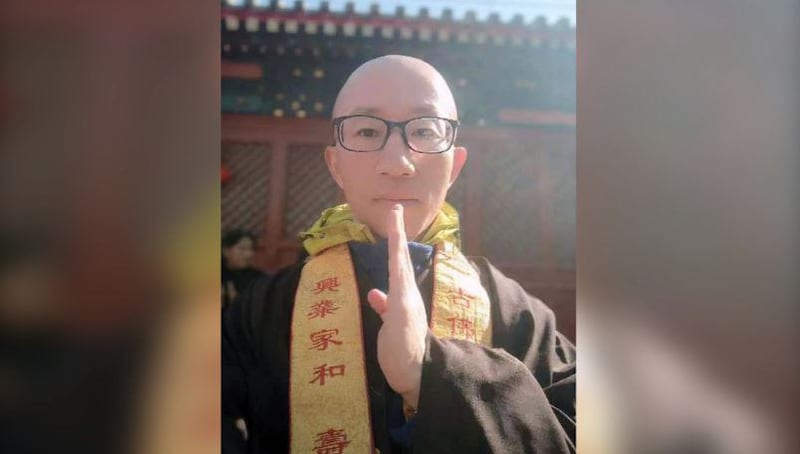Chinese pro-democracy campaigner Qi Zhiyong, whose legs were amputated after he was shot during the 1989 Tiananmen Square massacre, has died after a lifetime of disability, sickness and activism, fellow activists told Radio Free Asia. He was 67.
Qi was taken to a Beijing hospital after being taken ill during a family meal "some time ago," fellow dissident Jiang Lijun said. "He felt unwell after having an alcoholic drink and was taken to hospital, but they were unable to save him."
Australia-based dissident Sun Liyong said he had been unable to find out further details from Qi's family, who are under huge pressure from the authorities not to speak out.
"His wife doesn't want any contact with the outside world, because then the police would come to their home and threaten them," Sun said. "According to my understanding, his family members are afraid, and want to keep things low-key."
Sun said Qi had been suffering from kidney failure caused by uremia, in the later stages of diabetes, and had been going for four hours' dialysis every Monday, Wednesday and Friday at the time of his death. He had also been diagnosed with liver cancer.
Shot in both legs
Qi had spent most of his life as a double amputee after losing both legs due to gunshot injuries sustained during the 1989 Tiananmen massacre, in which the People's Liberation Army killed hundreds, possibly thousands of civilians, putting a bloody end to weeks of protests on Tiananmen Square.
"At 1.20 a.m. on June 4, 1989, I was shot in both legs at the same time in Xirongxian Hutong, Xidan," Qi once said in a video statement about his injuries.
"When I think back to June 4, 1989, it's not just my injuries that cause me pain -- the emotional pain is much worse," he said in the video clip, while battling sickness, disability and constant harassment by the authorities.

At the time of his shooting, Qi was 33 years old and employed as a painter at the Beijing No. 6 Municipal Construction company. His disability left him to eke out a meager living on subsistence payments supplemented by income as a street hawker.
Beijing-based rights activist Hu Jia said Qi was his best friend and had served as a living witness to the June 4 massacre throughout his life, paying a heavy price in the process.
"Brother Qi was left disabled by June 4. He embodied historical evidence and was a witness to the massacre by the authorities," Hu said. "The price he paid was second only to that paid by the students and citizens who died in Beijing."
"He was the only person disabled [in the crackdown] who persisted in speaking out for more than 30 years."
Last May, the Tiananmen Mothers, a group representing victims of the June 4 massacre that ended weeks of pro-democracy protests in 1989 President Xi Jinping to take responsibility for the actions of the government ahead of the 34th anniversary of the bloodshed.
Dwindling numbers
Authorities in China typically place dozens of pro-democracy activists and dissidents under house arrest or other forms of restriction ahead of the politically sensitive date, while members of the Tiananmen Mothers victims group are taken to make offerings to their loved ones under police escort.
Meanwhile, the number of living relatives of people killed in the bloodshed -- ordered by then-supreme leader Deng Xiaoping -- dwindles every year, as the group continues to call on Beijing to make public details of the massacre and its victims, to pursue those responsible, and to award compensation to victims' families.

Hu said many of Qi's later health problems stemmed from his 1989 injuries.
"If he had not been shot that night more than 30 years ago, he wouldn't have suffered from severe bleeding, amputation or hepatitis," Hu said. "I personally think that he might not have suffered from uremia or the like."
"He should still be alive ... if he had lived life day by day, working in a factory, he would still be alive today," he said. "He could have had a well-off, even middle-class life. He probably wouldn't have gotten divorced from his ex-wife."
Hu described Qi as "like a charging warrior" despite having only stumps where his legs should be.
He said Qi had longed in his later years to join his daughter Qi Ji in the United States, but wasn't allowed to leave China, partly due to the United States.
"They implemented a travel ban and other controls, and the United States didn't grant him a visa," Hu said. "All Brother Qi ever wanted was to see change in our country -- it was very simple."
Translated by Luisetta Mudie. Edited by Malcolm Foster.
